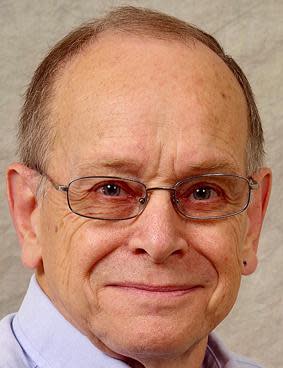Roundtable: What's your take on Christian nationalism?

Columnist Scott Reeder writes that Christian nationalism is entering the mainstream of political discourse. What do you think of Christian nationalism?

Creating a state religion would destroy democracy
Christian Nationalism is not really about Christianity, it’s about the centuries-long dominance of a social order where the superiority of whiteness, patriarchy and heterosexuality was taken for granted. A particular, narrow reading of Christianity has served, in part, to justify that social order. In the second half of the 20th century, thanks to economic expansion, civil rights, feminism and other changes, the fusion of these elements began to come apart, become visible, and open to question.
For millions who took that social order for granted, that has been a scary prospect. The result has been the “culture wars,” as the demand for change and the fierceness of resistance have both become stronger. Weaponized by politics, advertising and social media, voices have become ever more extreme, and fringe ideas like compulsory “Christianity” (including, of course, whiteness, patriarchy and heterosexuality) gain a wider hearing. But make no mistake, making Christianity the state religion would not put the genie of social change back in the bottle. Instead, it would destroy America. A state religion is profoundly antithetical to the values of the United States, explicitly forbidden in the First Amendment to the Constitution. And its creation would destroy democracy and lead inexorably to authoritarian rule. — David Amor
More:Scott Reeder's column on Christian nationalism

Critics brand all Trump supporters, conservatives with that term
Before we start, please define for me what a Christian is. Is it a Roman Catholic whose church teaches abortion is a sin or is it a Congregational church which supports abortion on demand? Is it a Southern Baptist who does not allow women pastors or Episcopalian which has ordained the first transgender woman as a priest at the National Cathedral?
Bandying about words like “Christian nationalism” conveniently omits a clear definition of what it is. For critics, all Trump supporters and conservative Christians are derisively branded with that term. Many of those who support the idea see it has simply an adherence to long-held Judeo-Christian teachings in public life. Without a precise definition, there is little point in debating the issue.
I believe Congress should make no law respecting an establishment of religion or prohibiting the free exercise thereof.
Many secular beliefs regarding reproductive rights and gender identity have become a religion for their proponents. I object equally to the imposition of their religious beliefs on the public. — Harry Bulkeley
These people using Bible to distort morality
It is easy to answer what I think of Christian Nationalism: I completely disagree with its existence because of the First Amendment to the U.S. Constitution. There is a separation of church and state. This amendment is meant to stop the government from interfering with churches and to keep religion out of the government. Religion should not be politicized although it is becoming more so by the day. The influence of religion on today’s politics cannot be denied.
One of the major problems with Christian nationalism is that it leaves out any religion that is not a Christian religion. The Christian nationalists want the United States to be an exclusively Christian nation. This is inherently wrong. These people are using the Bible to distort morality to fit their standards. In my opinion, this is a terrifying group of extremists that can be compared to white supremacists. — Jeannette Chernin
More:Jody Breuer: Employers want consistency; employees want time away from work

Term 'Christian nationalism' inflames more than explains
I have read Scott Reeder for years and respect his ideas and experience. So, my first reaction was that surely the Pilgrims and Puritans left England with the intent of establishing Christian commonwealths in the wilderness. Then I realized that he was referring mainly to the years 1774-1789.
There he was on solid ground. Though sessions for drafting the Constitution opened with prayers and references were made to the Almighty, the delegates took care not to give preference to any of the sects that composed American Christianity, a sentiment that was mightily reinforced in the First Amendment.
As to Christian nationalism, I don’t know anyone who professes that belief. However, it is easy to understand why some Christians believe that their values are under attack, and why secularists feel the same way.
One reason our society is divided is because terms such as “Christian nationalism” inflame more than they explain. — William Urban

Type of faith being espoused by Rep. Green steeped in hate
During a town hall in October 2020, Donald Trump said it was entirely possible Democrats, his enemies, were Satan-worshipping pedophiles. In April 2021, Rep. Marjorie Taylor Greene proposed forming a new political caucus based on Anglo-Saxon and Christian ideals. The blowback was immediate, and the idea was shelved. Fast forward to August 2022. During an interview, she decried the United States was founded on Christian principles, and she proudly identified as a Christian nationalist.The political movement of Christian nationalism, which was predicated on racism and antisemitism, has been around since the 1950s. Our country's founders were explicit in their writings that the United States is not nor should be founded on any particular religion. The religious right rejoiced when Roe vs. Wade was overturned, but recent primaries and elections are showing pro-choice voters are responding to it as overreach and an attack on basic human freedoms. The type of faith Greene and others are trying to promote is steeped in hate and bigotry which is contrary to basic Christian tenets. — John Hunigan
More:Roundtable: Is current inflation President Biden's fault

Supreme Court's decision 'a huge win for religious liberty'
Full disclosure: My wife and most of my family are Christian. I am, by choice, Jewish. The majority of our country’s founders and the general population is and have been members of Christian Churches, but the Bill of Rights is very specific about the keeping the government out of religion: “Congress shall make no law respecting an establishment of religion ...”
Scott Reeder, in his article misses the last part of that statement: “... or prohibiting the free exercise thereof;” His article is critical of U.S. Rep. Mary Miller because she called the Supreme Court’s decision “A huge win for religious liberty ....” Representative Miller was completely correct! After years of court rulings against expressions of religion in the public square, but supporting the RELIGION of atheism, Coach Kennedy can pray after his games, on the field; not requiring others to join him. — Charlie Gruner

Religion often used to forward a political or social belief
This country was founded on Christian values, which to me, makes some of the founding fathers' views suspect. Why? Because religion many times is a sword in the hand of a zealot. This belief in Christian nationalism isn’t new. It has sifted through this nation since this country’s inception. You can call it Christian nationalism, but I would refer to it as confirmation bias and propaganda. The southern states used the Bible to falsely conceptualize the “Curse of Ham” to approve of Blacks being slaves. The Confederacy used other biblical passages as well to substantiate slavery.
Whenever you put “It’s God’s will” in front of a propagandized movement — the religious sycophants will follow. And in this country, many times Christianity has been used to expediently forward a political and social belief. Andrew Jackson was notorious for exterminating, isolating and reducing the Native American population to ensure that “under the protection of the government and through the influence of good counsels, to cast off their savage habits and become an interesting, civilized and Christian community.” In “God We Trust.” The best example of this latest religious zeal was congresswoman Lauren Boebert’s speech that "The church is supposed to direct the government. The government is not supposed to direct the church. That is not how our founding fathers intended it." Call it what you will. It reeks of manifest destiny. — Stephen Podwojski
The Community Roundtable runs each Sunday and is made up of local writers. Community writers answer one question each week in 150 words or fewer.
This article originally appeared on Galesburg Register-Mail: Roundtable weighs in on Christian nationalism in the United States

